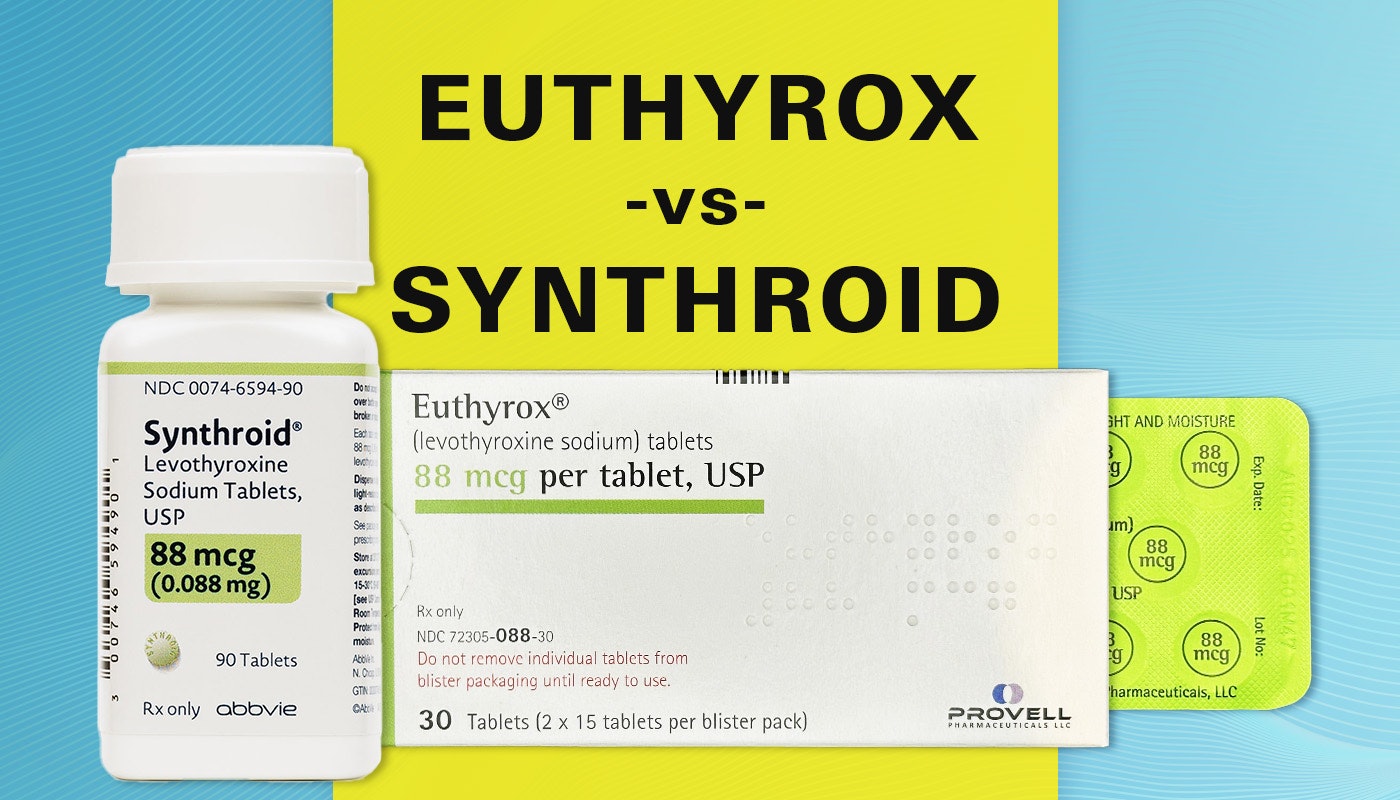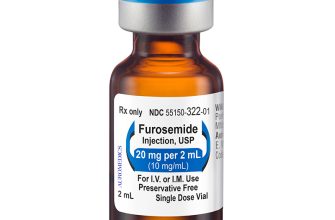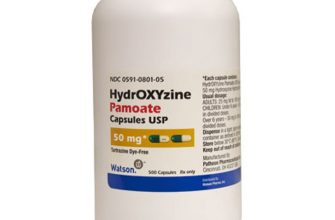Choose the generic levothyroxine. Multiple large-scale studies show comparable effectiveness between Synthroid (brand-name levothyroxine) and its generic counterparts. This means you can likely save money without compromising your thyroid health.
However, individual responses vary. Switching brands can sometimes cause slight fluctuations in hormone levels. Monitor your symptoms and regularly check your TSH (thyroid-stimulating hormone) levels with your doctor after switching to ensure your medication remains adequately effective. Your doctor will likely recommend blood tests to gauge the effectiveness of the treatment.
Consider these factors: Consistent dosage and brand are key. If you experience symptoms such as fatigue, weight gain, or mood changes after switching, contact your doctor immediately. They can adjust your dosage or suggest a different brand if necessary. Open communication with your physician is paramount for optimal thyroid management.
- Synthroid vs. Generic Levothyroxine: A Detailed Comparison
- Formulation and Ingredients
- Bioavailability and Absorption
- Cost
- Switching Brands
- Doctor’s Role
- Summary of Key Differences
- Understanding Synthroid’s Brand Name Status
- Generic Levothyroxine: Manufacturing and Regulation
- Comparing the Ingredients: Are There Significant Differences?
- Inactive Ingredient Variations
- Impact on Absorption
- A Closer Look at Inactive Ingredients
- Recommendations
- Switching Brands
- Bioequivalence: How Similar Are the Effects in the Body?
- Cost Comparison: Synthroid vs. Generic Options
- Factors Influencing Cost
- Making the Choice
- Patient Experiences and Doctor Recommendations: What Matters Most?
Synthroid vs. Generic Levothyroxine: A Detailed Comparison
Choose the levothyroxine that best suits your individual needs and works best for you, in consultation with your doctor. Generic levothyroxine is often a cost-effective alternative, while Synthroid offers brand recognition and a consistent manufacturing process. Let’s examine the key differences.
Formulation and Ingredients
Synthroid uses a specific manufacturing process resulting in a particular crystalline form of levothyroxine. Generic manufacturers must meet the same regulatory standards regarding purity and potency, but minor variations in inactive ingredients might exist. These variations aren’t always clinically significant, but some individuals might respond differently.
Bioavailability and Absorption
Bioavailability, meaning the amount of medication your body absorbs, is crucial for levothyroxine. Studies suggest Synthroid and many generics exhibit comparable bioavailability in most individuals. However, individual responses vary. Certain factors, like the simultaneous consumption of food or calcium supplements, can impact absorption regardless of brand.
- Food: Take levothyroxine on an empty stomach, at least 30-60 minutes before breakfast.
- Calcium and Iron: Separate these supplements by several hours from your levothyroxine dose.
Cost
Generic levothyroxine is considerably less expensive than Synthroid. This cost difference can be substantial over the long term. Consider this factor along with your individual health needs and your doctor’s recommendations.
Switching Brands
Switching brands necessitates careful monitoring by your doctor. If you switch, regular blood tests are recommended to ensure your thyroid hormone levels remain within the optimal range. Sudden changes may lead to symptoms such as fatigue, weight changes, or mood swings.
Doctor’s Role
Your physician plays a vital role in guiding your choice. They can discuss the potential benefits and drawbacks of each option in relation to your specific health situation and medical history. Regular monitoring of your thyroid hormone levels is critical, regardless of which brand you use.
Summary of Key Differences
- Cost: Generic levothyroxine is cheaper.
- Manufacturing: Synthroid uses a proprietary process.
- Bioavailability: Generally comparable, but individual variations exist.
- Switching: Requires close medical supervision.
Ultimately, the best choice depends on your individual circumstances and requires close collaboration with your doctor.
Understanding Synthroid’s Brand Name Status
Synthroid holds a prominent position because it’s the first levothyroxine product the FDA approved. This early market entry gave it significant brand recognition and trust among doctors and patients.
Longer history of clinical trials contribute to Synthroid’s reputation. Years of data support its efficacy and safety profile, influencing prescribing habits.
Consistent manufacturing processes are another key factor. Maintaining precise manufacturing standards fosters confidence in the drug’s reliability and predictability for patients.
However, generic levothyroxine often contains the same active ingredient and meets FDA standards. Many studies demonstrate bioequivalence, showing comparable blood levels after taking either brand or generic versions.
The price difference is substantial. Generics are significantly cheaper, making them a more accessible option for many patients.
Ultimately, the choice between Synthroid and a generic depends on individual needs and preferences. Discuss your options with your doctor. They can help you weigh the benefits and drawbacks of each based on your specific medical history and financial situation.
Generic Levothyroxine: Manufacturing and Regulation
Generic levothyroxine manufacturers must adhere to strict guidelines set by regulatory bodies like the FDA (in the US) and the EMA (in Europe). These guidelines cover every stage, from sourcing raw materials to final product testing.
The manufacturing process begins with the synthesis of levothyroxine. Manufacturers use highly controlled chemical processes to ensure purity and consistency. Impurities are rigorously monitored throughout production using advanced analytical techniques like High-Performance Liquid Chromatography (HPLC) and mass spectrometry.
Quality control is paramount. Multiple checks are performed at various stages, including tests for potency, dissolution rate, and the presence of potential contaminants. Finished products undergo rigorous stability testing to guarantee shelf life.
Regulatory agencies conduct regular inspections of manufacturing facilities and review the data submitted by manufacturers. They enforce strict Good Manufacturing Practices (GMP) to ensure quality and safety. Failure to meet these standards can result in product recalls or other regulatory actions.
Bioequivalence studies are conducted to demonstrate that generic levothyroxine performs comparably to the brand-name version. These studies measure the rate and extent to which the drug is absorbed into the bloodstream. Data from these studies are crucial for regulatory approval.
Transparency is key. Manufacturers must provide detailed information about their manufacturing processes and quality control measures to regulatory bodies. This information is reviewed to ensure compliance with regulations and to help ensure patient safety.
Comparing the Ingredients: Are There Significant Differences?
Both Synthroid and generic levothyroxine contain the same active ingredient: levothyroxine sodium. However, minor variations exist in inactive ingredients, which are the non-medicinal components. These inactive ingredients can include fillers, binders, and disintegrants, designed to help the medication form a tablet and dissolve properly.
Inactive Ingredient Variations
The specific inactive ingredients differ between brands, even among generic versions. Synthroid, for example, uses a specific blend while generic manufacturers might use a slightly different combination. These differences usually aren’t significant for most people. However, some individuals may find one formulation more suitable than another.
Impact on Absorption
While the active ingredient remains the same, the variation in inactive ingredients *could* theoretically affect absorption rates. This means the speed and efficiency with which your body absorbs the levothyroxine may differ. Such differences are typically slight and unlikely to cause considerable changes in overall thyroid hormone levels for most patients.
A Closer Look at Inactive Ingredients
| Ingredient Category | Possible Examples | Potential Impact |
|---|---|---|
| Fillers | Lactose, cellulose, cornstarch | Can affect tablet size and disintegration |
| Binders | Povidone, magnesium stearate | Help hold the tablet together |
| Disintegrants | Croscarmellose sodium, sodium starch glycolate | Aid in tablet breakdown for absorption |
Recommendations
Consult your doctor before switching between Synthroid and a generic version. If you experience symptoms of hypothyroidism or hyperthyroidism after switching, report this to your healthcare provider immediately. Individual reactions vary, and careful monitoring might be necessary. Don’t self-medicate; medical guidance is key to proper thyroid hormone management. A blood test will confirm whether your levothyroxine dosage is effectively managing your thyroid condition. Your doctor can help you choose the best formulation for your individual needs.
Switching Brands
If your doctor approves switching, it’s advisable to transition slowly and monitor your symptoms closely. Be sure to discuss any noticeable differences in your thyroid health after the switch.
Bioequivalence: How Similar Are the Effects in the Body?
Generic levothyroxine and Synthroid aim for identical results. The FDA requires generic versions to demonstrate bioequivalence, meaning they produce comparable levels of the active drug (levothyroxine) in your bloodstream over time. This involves rigorous testing.
Studies show that the peak blood levels (Cmax) and the area under the curve (AUC), which reflect overall drug exposure, are very similar between brand-name and generic levothyroxine. These similarities mean that the generic medications typically achieve equivalent therapeutic effects.
However, minor variations can occur between different generic brands or even batches from the same manufacturer due to factors like manufacturing processes. These differences are usually within acceptable ranges and are unlikely to significantly alter the treatment outcome. Your doctor monitors thyroid hormone levels through blood tests, ensuring your dosage is appropriate.
Important Note: While bioequivalence studies suggest similarity, individual responses to medication can vary. If you experience any changes in your symptoms, such as fatigue, weight changes, or mood shifts after switching to a generic, discuss this with your doctor. They may recommend adjustments in dosage or consider switching to a different brand or even back to Synthroid if necessary.
Remember: Always consult your doctor or pharmacist before making any changes to your medication.
Cost Comparison: Synthroid vs. Generic Options
Generic levothyroxine is significantly cheaper than Synthroid. Expect to pay substantially less for a 3-month supply of generic levothyroxine compared to brand-name Synthroid. The exact price difference varies depending on your insurance coverage, pharmacy, and location, but a generic option often costs only a fraction of the brand-name drug. Check your pharmacy’s price list or use a prescription price comparison website for current pricing in your area.
Factors Influencing Cost
Your insurance plan plays a huge role. Many insurance companies prefer generic medications due to lower costs, leading to lower co-pays for patients. If you have a high deductible plan, the initial out-of-pocket expense might be greater, but generic levothyroxine will still save you money in the long run. Mail-order pharmacies also frequently offer lower prices than local pharmacies, especially on larger quantities.
Making the Choice
While cost is a major factor, discuss your options with your doctor. Although generics are bioequivalent, meaning they contain the same active ingredient and are absorbed similarly, some patients report feeling better on one brand over another. Your doctor can help you weigh the cost savings against any potential differences in personal response to various brands. Open communication with your doctor ensures you find the best and most affordable treatment for your needs.
Patient Experiences and Doctor Recommendations: What Matters Most?
Trust your doctor’s judgment. They understand your medical history and can assess your individual needs. Generic levothyroxine is often bioequivalent to Synthroid, meaning it contains the same amount of active ingredient and works similarly in the body for many people. However, individual responses vary.
Many patients report no noticeable difference between Synthroid and generic brands. Others experience changes in their symptoms, such as fatigue or weight changes, when switching. This is why open communication with your doctor is critical.
- Monitor your symptoms carefully: Note any changes in energy levels, mood, weight, or bowel movements after starting a new medication.
- Maintain regular blood tests: Thyroid hormone levels need consistent monitoring. Your doctor will adjust your dosage based on these results. Regular tests help find the optimal dosage for you regardless of brand.
- Communicate openly with your doctor: Report any side effects or concerns. They may recommend a switch to a different brand, adjustment in dosage, or other options.
If switching to a generic causes problems, don’t hesitate to discuss it with your doctor. They might recommend trying a different generic brand or returning to Synthroid. Your well-being is the priority.
- Consider the cost: Generic levothyroxine is usually less expensive than Synthroid.
- Consider consistency: Sticking with the same brand can help avoid unexpected fluctuations in thyroid hormone levels. However, this should be balanced with the need to find the right medication for your individual needs.
- Consider your body’s response: Listen to your body and communicate effectively with your doctor to identify the best option for your specific situation. This is more important than brand loyalty.
Ultimately, the best thyroid medication depends on you. Collaboration with your doctor will ensure you find the right medicine and dosage for optimal health.









